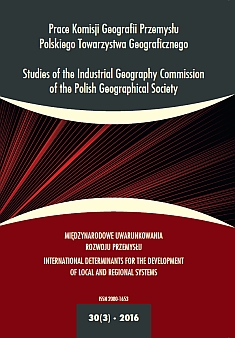Ewolucja struktur produkcji i zatrudnienia w gospodarkach rynkowych. Wnioski dla Polski
DOI:
https://doi.org/10.24917/20801653.303.4Słowa kluczowe:
dezindustrializacja, dualizm dezindustrializacji, przemiany strukturalne, reindustrializacjaAbstrakt
Artykuł oddaje zróżnicowaną problematykę przemian strukturalnych w gospodarkach rynkowychkrajów wysoko rozwiniętych, które przeszły silną industrializację, oraz w gospodarkach rynkowych krajówrozwijających się, które przedwcześnie wchodzą w dezindustrializację. Ukazanie w warstwie poznawczejopracowania najistotniejszych kwestii przemian strukturalnych pozwala - w jego warstwie empirycznej -podjąć próbę zarysowania możliwych interpretacji dotyczących efektów zmian struktury zatrudnienia w badanychkrajach. Za pomocą sześciosektorowego podziału gospodarki przedstawiono zmiany udziałów zatrudnieniaw wybranych gospodarkach w latach 1970-2014. Przy użyciu prostych współczynników statystycznychzobrazowano korelację między udziałami zatrudnienia w przemyśle przetwórczym i usługach rynkowycha poziomami PKB per capita oraz określono współczynniki determinacji. Zasadniczym celem pracy jest wyeksponowanieprzedwczesnej dezindustrializacji gospodarki Polski i wskazanie potrzeby jej reindustrializacji.Downloads
Metrics
Bibliografia
Baumol, W.J., Blackman E.N., Wolff E.N. (1989). Productivity and American Leadership: the long view. Massachusetts, Cambridge: MIT Press.
Clark, C. (1957). The Conditions of Economic Progress. London: Macmillan.
Dasgupta, S., Singh, A. (2005). Will services be the new engine of economic growth in India? Centre for Business Research. University of Cambridge Working Paper, 310.
Dasgupta, S., Singh, A. (2006). Manufacturing, Services and Premature Deindustrialization in Developing Countries. A Kaldorian Analysis. UNU-WIDER WIDER Research Paper, 49.
Fisher, A.G.B. (1945). Economic Progress and Social Security. London.
Fisher, A.G.B. (1952). A note on tertiary production. The Economic Journal, 62.
Fourastié, J. (1954). Die Grosse Hoffnung des zwanzigsten Jahrhunderts. Köln-Deutz: Bund-Verlag.
Fourastié, J. (1972). Myśli przewodnie. Warszawa: PIW.
GUS (2016a, 3 lipca). Rachunki narodowe. Pozyskano z http://stat.gov.pl/statystyka-miedzynarodowa/ porownania-miedzynarodowe/tablice-o-krajach-wedlug-tematow/rachunki-narodowe/
GUS (2016b, 3 lipca). Roczne wskaźniki makroekonomiczne, wartość dodana brutto ogółem w cenach stałych z 2000 roku. Pozyskano z http://stat.gov.pl/wskazniki-makroekonomiczne/
GUS (2016c, 1 lipca). Tablice o krajach – przemysł i budownictwo. Pozyskano z http://stat.gov.pl/statystyka-miedzynarodowa/porownania-miedzynarodowe/tablice-o-krajach-wedlugtematow/ przemysl-i-budownictwo/
Kaldor, N. (1967). Strategic Factors in Economic Development. New York State School of Industrial and Labour Relations. Ithaca NY: Cornell University.
Karpiński, A., Paradysz, S., Soroka, P., Żółtkowski, W. (2015). Od uprzemysłowienia w PRL do deindustrializacji kraju. Warszawa: Wydawnictwo Muza SA.
Kłosiński, K.A. (2011). Światowy rynek usług w początkach XXI wieku. Warszawa: Polskie Wydawnictwo Ekonomiczne.
Kwiatkowski, E. (1980). Teoria trzech sektorów. Warszawa: PWN.
OECD (2016a). Stat Labour Force Statistics. DOI :10.1787/lfs-lfs-data-en OECD (2016b, 3 lipca). Pozyskano z http://stats.oecd.org/viewhtml.aspx?datasetcode=SNA_ TABLE3&lang=en#
Piketty, T. (2015). Kapitał XXI wieku. Warszawa: Wydawnictwo Krytyki Politycznej.
Rifkin, J. (2001). Koniec pracy. Schyłek siły roboczej na świecie i początek ery postrynkowej. Wrocław: Wydawnictwo Dolnośląskie.
Rifkin, J. (2011). Trzecia rewolucja przemysłowa. Katowice: Wydawnictwo Sonia Draga.
Rodrik, D. (2016). Premature deindustrialization. Journal of Economic Growth, 21.
Rowthorn, R., Ramaswamy, R. (1997). Deindustrialization: causes and implications. IMF Working Paper, 42.
Waląg P. (2012). Determinanty zmian struktury zatrudnienia w okresie transformacji gospodarki polskiej. Uniwersytet Opolski, Wydział Ekonomiczny (niepublikowana praca doktorska).
Pobrania
Opublikowane
Jak cytować
Numer
Dział
Licencja
Artykuły publikowane są zgodnie z warunkami licencji Creative Commons (CC BY-ND 4.0; uznanie autorstwa-bez utworów zależnych).

